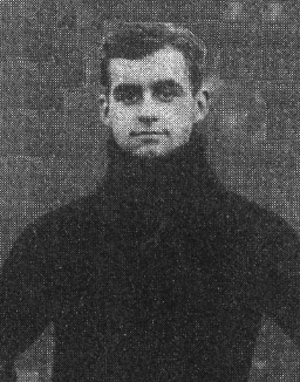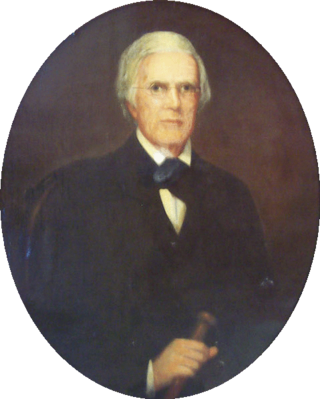Related Research Articles

Joseph Carlton Loser was an American politician and a United States representative from Tennessee.

Richard Harmon Fulton was an American Democratic politician who served as a member of the Tennessee State Senate and of the United States House of Representatives, and the second mayor of the Metropolitan Government of Nashville and Davidson County.

Mount Olivet Cemetery is a 206-acre (83 ha) cemetery located in Nashville, Tennessee. It is located approximately two miles East of downtown Nashville, and adjacent to the Catholic Calvary Cemetery. It is open to the public during daylight hours.
Thomas A. Kercheval was a Republican Tennessee Senator and the Mayor of Nashville for twelve years.
Robert Ewing was an American politician and businessman. He served as the mayor of Nashville, Tennessee, from 1914 to 1916, and he was the vice president of the Southern Iron Company.

William James Wade Jr., often referred to during his playing career as Billy Wade, was an American football quarterback who played in the National Football League (NFL) for the Los Angeles Rams (1954-1960) and Chicago Bears (1961-1966).

Frank Lester Murrey was an American college football player, track athlete, and banker. He plaued football at Princeton University from 1918 to 1920 and was selected by Walter Camp as the first-team quarterback on the 1918 All-America college football team.
Hilary Ewing Howse (1866–1938) was an American businessman and politician. He served as the Mayor of Nashville from 1909 to 1913, and again from 1923 to 1938.
William Percy Sharpe (1871-1942) was an American Democratic politician. He served as Mayor of Nashville, Tennessee from 1922 to 1923.
Felix Zollicoffer Wilson (1866–1950) was an American Democratic politician. He served as the Mayor of Nashville, Tennessee from 1921 to 1922.

James Marshall Head Jr. (1855–1930) was an American politician in the Democratic Party. He served as the Mayor of Nashville, Tennessee for two successive terms, 1900 to 1904, during which he created many of the city's public parks. In 1903, Head was mentioned by William Jennings Bryan as a possible Democratic candidate for President of the United States. He was editor of a newspaper called The Nashville American and served on the Democratic National Committee. He was president of the League of American Municipalities and was an orator and debater on the form of city government in the U.S., favoring a mayor and city council system rather than government by commissioners. After serving as Nashville mayor, Head moved to Boston where he practiced law and became vice-president of Warren Brothers Company, a road-building business.

John Owsley Manier was an American college football player and coach and physician. He played at Vanderbilt University as a Fullback from 1904 to 1906 and at the University of Pennsylvania in 1908 as a halfback. Manier was a third-team selection on the 1906 College Football All-America Team and was named to the College Football All-Southern Team in 1904, 1905, and 1906. After graduating from Penn with a medical degree, he return to Vanderbilt and an assistant medical professor and assistant football coach.

Ferdinand Emery Kuhn was a shoe merchant known as the "Father of the Knights of Columbus in the South." He was also president of the 1908 Southern Association champion Nashville Vols baseball team.
Albert E. Hill was an American politician. He served as a member of the Tennessee House of Representatives and the Tennessee Senate, including as Speaker of the Senate from 1915 to 1917. He supported the labor movement and public education.
Edward Tucker Seay was an American lawyer and a politician. He served as the speaker of the Tennessee Senate from 1901 to 1903. He represented the Louisville and Nashville Railroad, and he was the acting dean of the Vanderbilt University Law School from 1929 to 1930.

Joseph Thorpe Elliston was an American silversmith, planter and politician. He served as the fourth mayor of Nashville, Tennessee, from 1814 to 1817. He owned land in mid-town Nashville, on parts of modern-day Centennial Park, Vanderbilt University, and adjacent West End Park.
William R. Elliston (1815–1870) was an American planter, slaveholder and politician. He served as a member of the Tennessee House of Representatives from 1845 to 1847. He owned Burlington Plantation in what is now Nashville, Tennessee. An investor in railroads and real estate, Elliston entered his horses in equestrian competitions. The former plantation property was later developed as modern-day Centennial Park, Vanderbilt University and West End Park.
Telfair Hodgson Jr., also known as Telfair Hodgson, was an American businessman and academic administrator. He was the treasurer of Sewanee: The University of the South from 1908 to 1949. He was also the president of the Bank of Sewanee, and a developer of Belle Meade, Tennessee.
Morton Boyte Howell was an American Masonic leader, lawyer and politician. He served as the mayor of Nashville, Tennessee, in 1875–1876.
Earl Caspar Arnold was an American academic administrator. He served as the dean of the Vanderbilt University Law School from 1930 to 1945.
References
- 1 2 3 Friends of Metropolitan Archives of Nashville and Davidson County, TN
- 1 2 3 4 5 6 7 8 9 10 "William Gupton Rites Tomorrow. Nashville Ex-Mayor, Postmaster Dies In Doctor's Office". The Tennessean. August 13, 1957. pp. 1, 22. Retrieved June 23, 2018.
- 1 2 "Former Mayor of Nashville Dies At 86" . The Leaf-Chronicle. August 13, 1957. p. 7. Retrieved June 23, 2018– via Newspapers.com.
- ↑ Ewing, David (March 15, 2018). "Megan Barry wasn't first Nashville mayor to quit" . The Tennessean. p. A15. Retrieved June 23, 2018– via Newspapers.com.
- ↑ "J. Carlton Loser Rites Set Tomorrow" . The Tennessean. August 1, 1984. p. 18. Retrieved June 23, 2018– via Newspapers.com.
